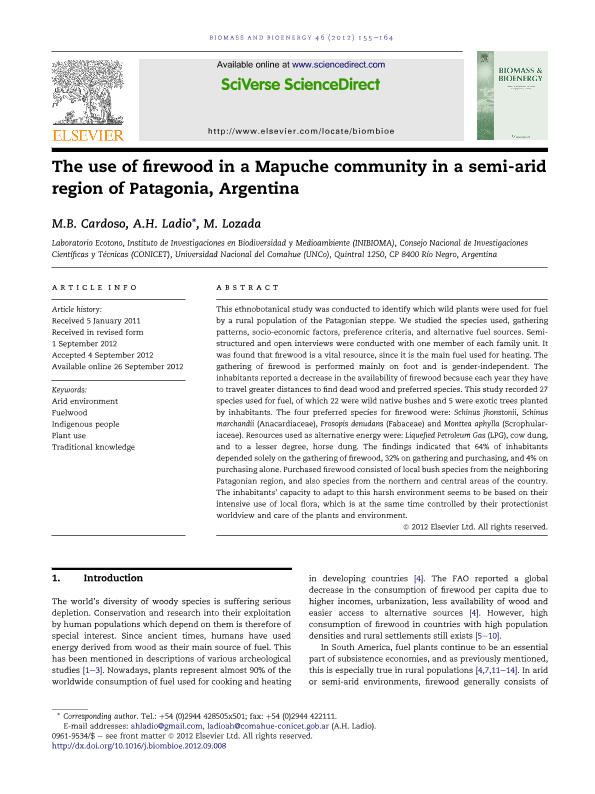Artículo
The use of firewood in a Mapuche community in a semi-arid region of Patagonia, Argentina
Fecha de publicación:
11/2012
Editorial:
Pergamon-Elsevier Science Ltd
Revista:
Biomass and Bioenergy
ISSN:
0961-9534
Idioma:
Inglés
Tipo de recurso:
Artículo publicado
Clasificación temática:
Resumen
This ethnobotanical study was conducted to identify which wild plants were used for fuel by a rural population of the Patagonian steppe. We studied the species used, gathering patterns, socio-economic factors, preference criteria, and alternative fuel sources. Semi-structured and open interviews were conducted with one member of each family unit. It was found that firewood is a vital resource, since it is the main fuel used for heating. The gathering of firewood is performed mainly on foot and is gender-independent. The inhabitants reported a decrease in the availability of firewood because each year they have to travel greater distances to find dead wood and preferred species. This study recorded 27 species used for fuel, of which 22 were wild native bushes and 5 were exotic trees planted by inhabitants. The four preferred species for firewood were: Schinus jhonstonii, Schinus marchandii (Anacardiaceae), Prosopis denudans (Fabaceae) and Monttea aphylla (Scrophulariaceae). Resources used as alternative energy were: Liquefied Petroleum Gas (LPG), cow dung, and to a lesser degree, horse dung. The findings indicated that 64% of inhabitants depended solely on the gathering of firewood, 32% on gathering and purchasing, and 4% on purchasing alone. Purchased firewood consisted of local bush species from the neighboring Patagonian region, and also species from the northern and central areas of the country. The inhabitants' capacity to adapt to this harsh environment seems to be based on their intensive use of local flora, which is at the same time controlled by their protectionist worldview and care of the plants and environment. © 2012 Elsevier Ltd.
Palabras clave:
Arid Environment
,
Fuelwood
,
Indigenous People
,
Plant Use
,
Traditional Knowledge
Archivos asociados
Licencia
Identificadores
Colecciones
Articulos(INIBIOMA)
Articulos de INST. DE INVEST.EN BIODIVERSIDAD Y MEDIOAMBIENTE
Articulos de INST. DE INVEST.EN BIODIVERSIDAD Y MEDIOAMBIENTE
Citación
Cardoso, María Betina; Ladio, Ana Haydee; Lozada, Mariana; The use of firewood in a Mapuche community in a semi-arid region of Patagonia, Argentina; Pergamon-Elsevier Science Ltd; Biomass and Bioenergy; 46; 11-2012; 155-164
Compartir
Altmétricas




